Amusing Ourselves to Death
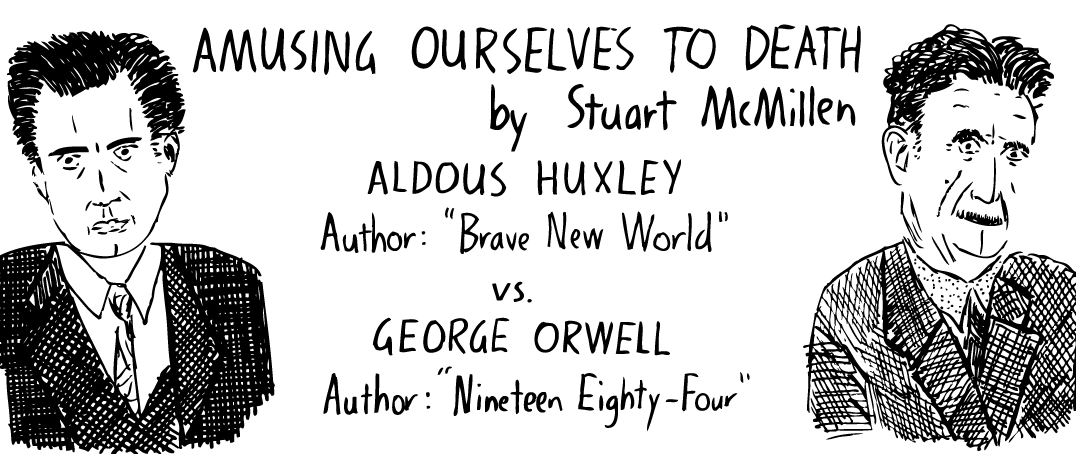
The Amusing Ourselves to Death comic: Neil Postman’s ‘Orwell versus Huxley’
Long-time readers will remember a comic I posted in May 2009 called Amusing Ourselves to Death. It was an adaptation of the foreword to Neil Postman‘s Amusing Ourselves to Death, a book originally published in 1985. The passage compares the futuristic visions of George Orwell’s Nineteen Eighty-Four with Aldous Huxley’s Brave New World. It suggests that the greater danger to society is not the iron fist of government from Orwell’s vision, but the attention-sapping distractions of technology depicted by Huxley.
This comic was respectfully removed from my website in March 2012 due to the wishes of the Neil Postman’s estate. After 2.5 years in the wild, I decided it was time to formally clarify my position with the copyright holder regarding their feelings on the piece. I proactively contacted them, and received notification that they would prefer the comic was removed. Respecting their wishes, I removed the comic without hesitation.
What follows are some reflections on a comic which has been removed from the internet. A piece of my back catlogue which I am walking away from.
A selection of drawings (minus Postman’s text) are interspersed throughout this post.
Amusing Ourselves to Death: a cover version
Amusing Ourselves to Death was an anomaly of my back catalogue. The only one not fully written and drawn by me. A ‘cover version’ of sorts.
The comic was also a milestone of my back catalogue. One of the ones that made me pull up my socks. The reasons for this are twofold. Firstly I rose to the game of conveying the story through my artwork. The second factor was the reader response, which was quite unlike anything I had seen before. Word of mouth spread, and a lot of eyeballs were pointed my way.
After a relatively quiet few days on the web (albeit with a good response from regular readers), things soon went bananas. The comic reached the front page of reddit.com, and 31,500 readers accessed the comic within a 3 hour window. A victim of its own success, this spike in traffic choked the performance of other websites on its shared server (I had only paid for a ‘budget’ AU$30/year hosting account). The host pulled the plug on me.
Drawing Amusing Ourselves to Death: motivations
Let me step back and describe my original motivations behind the comic.
My intentions regarding Amusing Ourselves to Death were always honest. Hyped up after reading Neil Postman’s book in 2009, I intended to draw a ‘teaser’ comic which would compel readers to read Amusing Ourselves to Death in full. Judging by reader feedback, that is what happened. Many people contacted me saying that I had turned them onto Amusing Ourselves to Death and then liked what they read. The comic clearly referenced Postman’s book as the source of the text component of the piece. I did not sell the comics for money or profit from it.
Of course, motivations are one thing, and the law is another. I created the comic as a complete amateur, operating a non-profit website dedicated to sharing ideas with the world. As time passed, I found that creating comics became what I wanted to do professionally, and Amusing Ourselves to Death’s presence on my server became a grey area of uncertainty. I was moving towards a future with comics as a legitimate way for me to earn a living. Could I continue displaying Amusing Ourselves to Death on my website?
Copyright law
I fished around for opinions. Some people tried to reassure me “it falls under Fair Use, mate”. But the more I read into copyright law, the more uncertain I became. Was the comic transformative enough to be considered Fair Use? I had used less than 1 page of text from a 208 page book, but had I taken the ‘essence’ of the book?
It became clear that even if I was fully complying with the law, that would not be enough to prevent legal action being brought against me. I read with horror the Kind of Bloop case. Would the copyright holder of Amusing Ourselves to Death have the same reaction?
Asking the question
The answer became clear: to ask the copyright holder directly. A US Library of Congress search pointed me in their direction, and I emailed my request. Thankfully their simple response was to politely ask for the piece to be removed.
Moving forward
So the bite-sized comic about the dangers of our limited attention spans (ironic, eh?) is no more. The comic has been deleted from my website, and I feel good respecting the wishes of the copyright holders.
I still own the copyright to my drawings from the Amusing Ourselves to Death comic. Some of my favourites appear in this blog post. But I see no point in putting the wordless series of postcards online at recombinantrecords.net. It’s time to move on.
The question marks are gone. I now have a body of work which is 100% owned by me. And more are in the pipeline right now.
For those of you that missed the comic the first time around, why not go straight to the source. Neil Postman’s book changed my view of the world, and caused me to alter many of my attitudes and habits. Buy Amusing Ourselves to Death new/used (aff), or track it down from your local library.








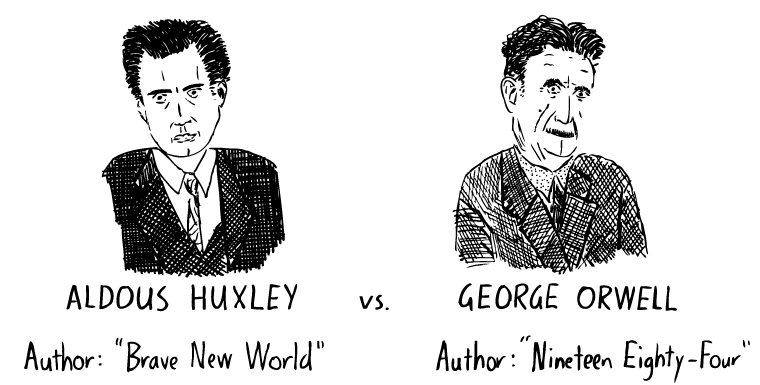
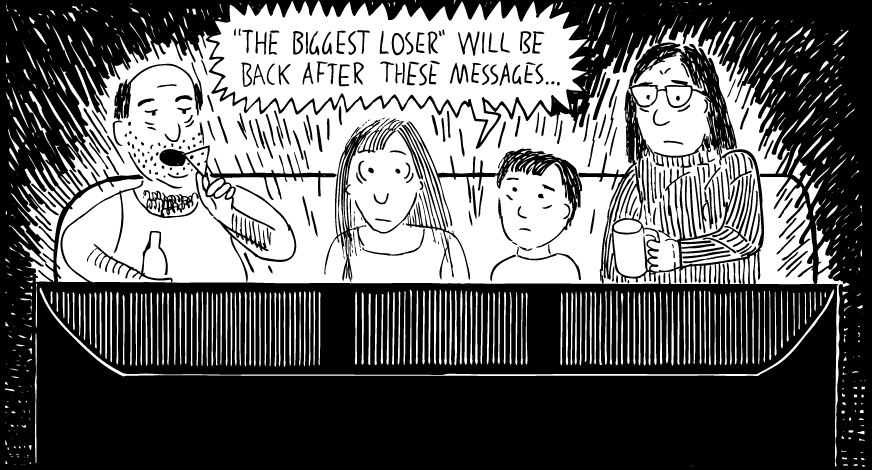
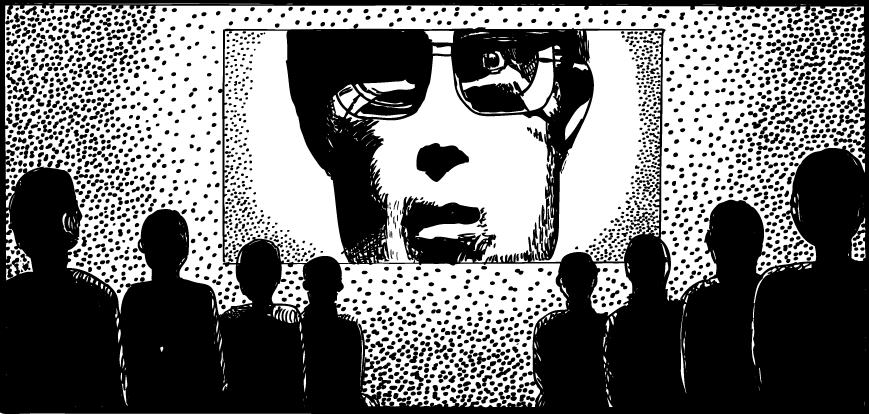
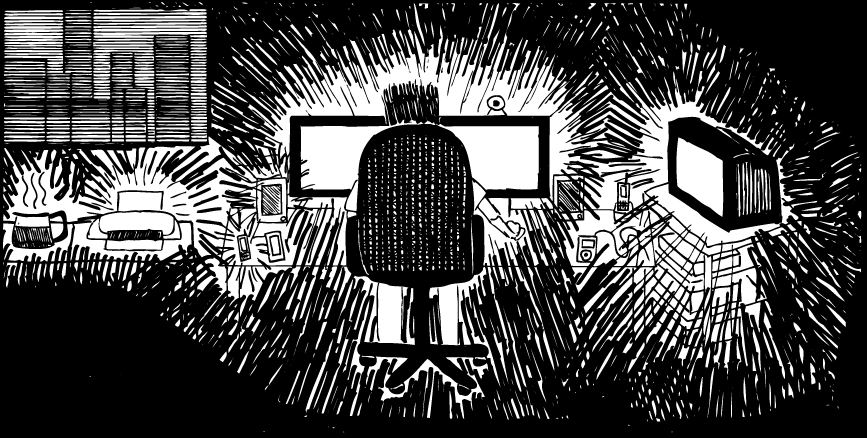
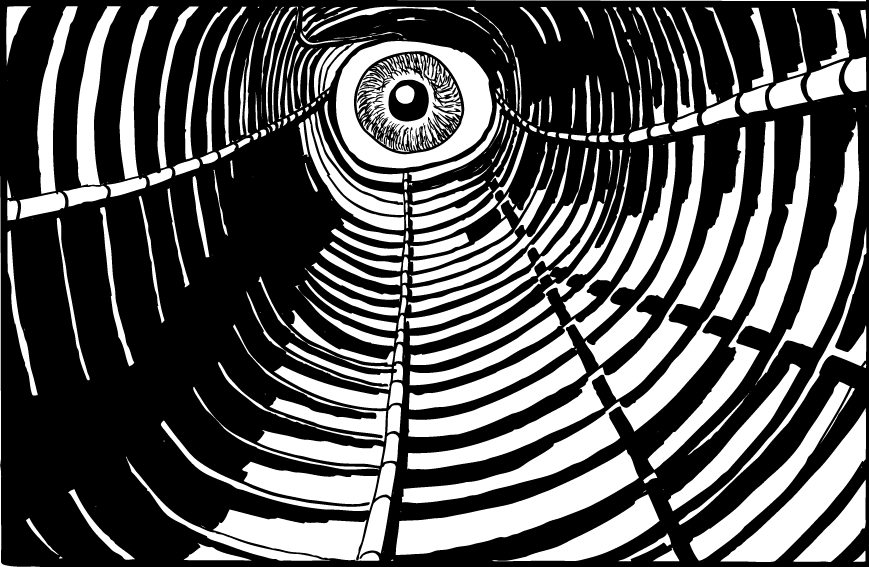
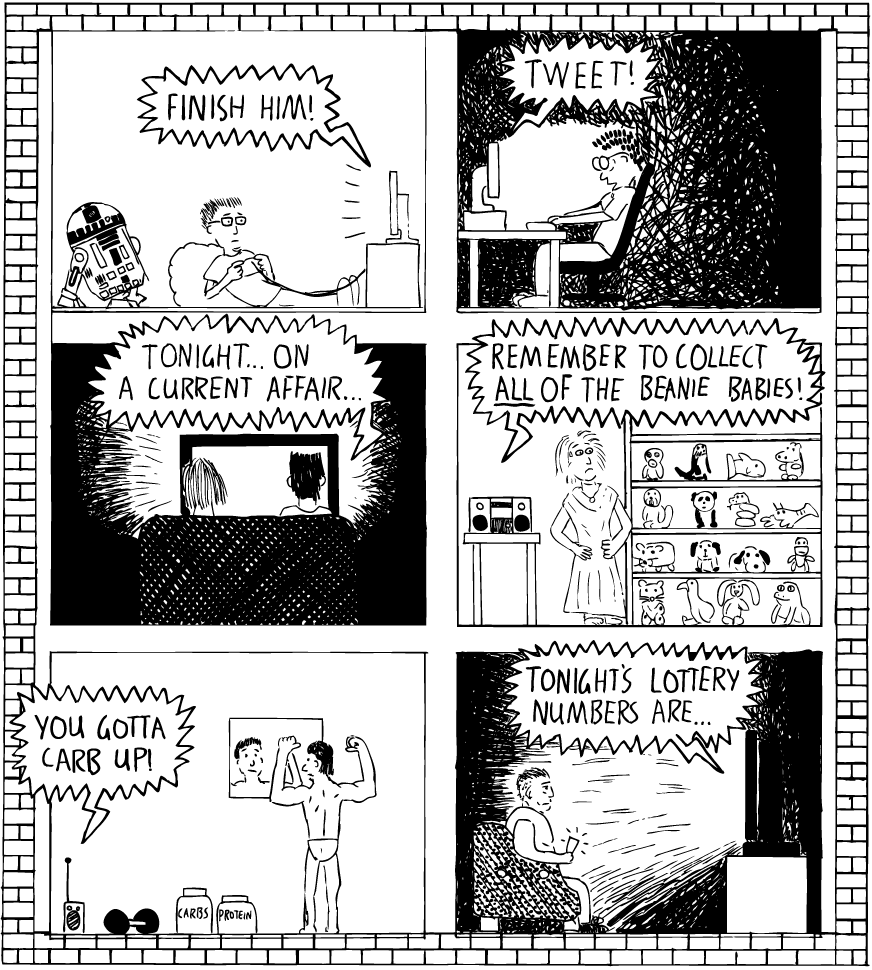
Comments
Brian
I wonder if the copyright holders still see it the same way now. A lot more people now understand that when a work pays homage to great original work, as I thinks yours did, that the creator or current copyright holder actually benefits. I'm someone who had actually read and really liked Amusing Ourselves To Death. Postman's ideas are IMO important and worthwhile. It's shortsighted of the copyright holder to take a position that inhibits the spread of those ideas. It's almost certainly antithetical to what Postman would have wanted.
Simon
Such a pity that you cannot publish the text and the illustrations together. There is a synchronicity here between text and visual image that is very impactful. Why not illustrate The Wasteland? It's a hundred years since its publication.
tin
Hi there! I've always loved this comic. I first want to Thank YOU very much. And totally agree with the latest comment from Chris Andrews. Many people unaware of the existence of Neil Postman's book got to know it by your comic. I don't think your work has done any damage to him. After all, Postman's book also is inspired in Huxley's and Orwell's. It could be said "a complementary work". And the same for your comic: it summarizes the 3 books extremely well. All the four works are different approaches to an urgent truth that needs to be told to and understood by this and the next generations of human - if we intend to survive our stupidity of course. And by the way, the new works are so great. Thank you again BEst!
Chris Andrews
Well that’s just amazing – you effectively created an advertisement for their book, and a very effective one, for free, which undoubtedly made money for them, and they won’t let you keep it posted. They should be paying you to keep it posted! This is a manifestation of a whole big problem with the concepts of copyright and patents. No idea ever exists in a vacuum – ideas are always an extension of, and built on, other people’s ideas. Many great thinkers acknowledge this. Isaac Newton, perhaps the equal greatest thinker of all time (along with Einstein), was aware of this; he said “If I have seen further than others, it is by standing upon the shoulders of giants.” The Wright Brothers perfectly exemplify the opposite ideal: the obsessive ownership of ideas. They built their first aircraft on the knowledge obtained by many of the pioneers of flying, such as Otto Lilienthal, and then patented it. They then spent decades in a legal battle with the likes of Glen Curtiss over his use of ailerons, claiming that his, and other’s, aircraft were based on their ideas. (The Wright Brothers design, based on warping the wings for control, was flawed in that it could never have been scaled up, thereby limiting their aircraft to playthings – ailerons resolved this limitation. Can you imagine an Airbus A380 controlled by warping its wings?) I printed out your Amusing Ourselves to Death comic on A4 sheets, sticky-taped them together and hung it on the wall next to my desk in the office I worked in, in Nambour. I’ve just realised that this was only 150km away from where you drew it!
Interesante comparativa nos muestra si nos estamos convirtiendo en la sociedad del libro ?1984? o la de ?Un Mundo Feliz? | Periodismo Alternativo | Las Variedades de Venezuela y El Mundo Sin Borregos.
[…] al trabajo de Stuart McMillen podemos comparar dos obras claves para entender la manipulación mediática. Por un lado, la […]
Wild Chasing Human | An Upturned Soul
[…] Stuart McMillen (the entirety of which can be found […]
Why I tweet « James McPherson's Media & Politics Blog
[…] the forward to his book (a forward so brilliant that it has been illustrated via a Stuart McMillen comic and a YouTube video), compares the two […]
oscar breetveld
Dear Stuart, I do agree that Neil Postmans idea's are very interesting and have big consequences on actions and thoughts. Therefor I liked your strip interpretation of his words very well. I do not agree that his words are absolutely restricted to copy under copyright law. It is permitted to enhance humor and make pastiche too texts of authors. And making a strip is always a interpretation? So I am happy that, although you erased your strip from your blog, there still are many copies and examples to find in the archives and pictures on the internet?.
Jason P
It seems a little short sighted on the part of the copyright holders to turn down a tastefully done work that serves mainly to promote and increase the reach and intellectual legacy of the original work (not to mention sales). Maybe even dumb, although without hearing a more complete rationale from them, that is not conclusive.
Orwell VS Huxley – Dos visiones acerca del futuro de la humanidad | The Planet Earth Blog
[…] buena la comparación de Stuart McMillen acerca de las dos visiones distópicas de George Orwell en su libro “1984″ y […]
Quick thoughts inspired by a comic, a quote, a book, and a movie. | TO THE EXOPLANETS
[…] won’t post a copy of the strip because it was removed by the artist due to copyright, but if you google it I’m sure it’s posted plenty of other places (otherwise how would […]
Queen Street Mall, March 2013 – Or, “Why I fear the Internet is ruining us.” | Post-It Notes Didn't Cut It
[...] has since been taken down (glad I have a hard copy in the ‘vault’), I wished to credit Mr.McMillen for quite aptly summing up the idea of the two extremes; deprivation/control of information, versus [...]
Миллионы, подсевшие на клик
[...] убрать его с сайта — об этом он пишет здесь. Впрочем, сам напросился. Запись опубликована в [...]
Donald Snyder
I too share the comic with my Media and Communication Studies students every semester. This semester I am having them read Postman's Introduction and first chapter, along with this blog post, the original comic strip (still available online - it is kind of like when Danger Mouse received cease and desist warnings from the Beatles and Jay-Z's lawyers), and an essay by Henry Jenkins on Convergence Culture. From this we discuss the relevance of Postman's argument, and the rights of consumers to claim ownership over the culture that surrounds them. While I can't deny the economic fear of lawsuit, I do think that this example falls under the protections of fair use. It is a question that we really need to grapple with or there will be serious limits on creativity and discourse. What I wonder is how far it goes. In this specific case you retain the rights over your drawings but did you get permission from the holders of Apple's 1984 superbowl advertisement to replicate the image of big brother on the screen controlling his masses? Did the creators of that commercial get the rights from the estate of Huxley?
Kathy Patterson
I am sad this is no longer easily available but I respect your respect of the 'copyright holders'. Every year I shared your comic with my students and it typically creates more discussion than nearly anything else. It is very wise commentary and often students have read these works in high school which makes the discussion more meaningful. Thank you for creating it and I hope you find a way to post it again in the future. (btw, it's not impossible to find online, dare I say).
Florian
I loved this work. sad |-:
John Rooke
Which all seems to show that the biggest threat is neither state oppression nor media distraction, but the extension of private property until even our thoughts are owned by someone else.
Stan
So, the copyright holders are his relatives. I wonder about that. Why? Did they create the book? What is the purpose of copyright? To make creation property or to support and encourage creation? I can see why someone who writes a book (or cartoon), writes a song, or does any of the creative things we all benefit from should get the income their creation generates. But I fail to see why copyright is transferable. I am sure it allows for the creation of lots more income, but that was not the purpose of copyright, as far as I know (I acknowledge that I am not an expert) and even if it were, I should disagree with the mobility of its protections as, in the case presented in the original post, there are costs associated with the protections. Copyright is not meant to hamper the free flow of ideas but to encourage it. I disagree with a second point. The theme of the book. or any book, is not, to me, subject to copyright, especially when the original is cited. Credit is given where due and all profits (none, in this case) are protected (perhaps even enhanced, if readers of the comic buy the book). So, what were the comic's violations of the protection? The title? The one line? Are these damages that amount to a violation of the law. Perhaps lawyers would argue that they are, but lawyers make little money without violations of law and, I am afraid, their material interests often cloud their vision of justice. I think most reasonable people would not feel that an injustice had been committed.
seb
I honestly think if the comic was called something different that didn't reference the book directly there wouldn't be an issue. Artist are always influenced by the works around. If that's not the case then someone better tell Kate Bush to remove Cloudbusting because it based on the book "a Book of dreams" about Wilhelm Reich.